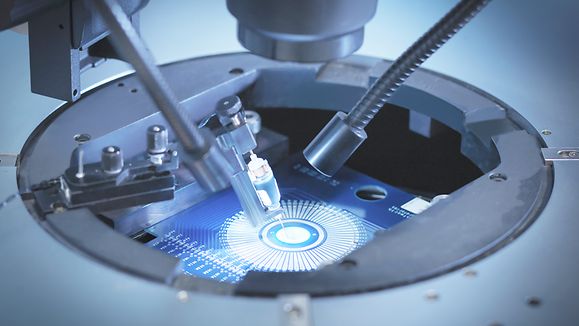Press Release Electronics & Microtechnology
Intel to Invest €17 Billion in German Chip Gigafactory
US-based semiconductor manufacturer Intel has officially announced Magdeburg as the location for its new European semiconductor production facilities. It’s the largest-ever foreign direct business investment in the country and in Europe as a whole.
Mar 15, 2022
The German city of Magdeburg in the regional state of Saxony-Anhalt has beaten out competition from around Europe and attracted a landmark investment from the world’s largest maker of semiconductors. Intel will initially spend EUR 17 billion on its new location but could put around EUR 80 billion in its European operations, if it builds all of the construction facilities – or “fabs” – that are planned. By comparison, the gigafactory carmaker Tesla is building outside Berlin is worth EUR 5.8 billion.
German Minister for Economic Affairs and Climate Action Robert Habeck called Intel’s expansion “an important impulse for the economy in a difficult time and a major leap forward for Europe’s digital sovereignty."
“Intel’s decision is a huge triumph for Germany as a business location,” says Robert Hermann, CEO of the international business promotion agency Germany Trade & Invest (GTAI). “It underscores the attractiveness of the country as a location for international companies within the European Union.”
“We are excited to bring semiconductor manufacturing in Europe and Germany a big step forward,” says Intel Germany VP and Managing Director Christin Eisenschmid. “Our cooperation with Germany Trade & Invest played a decisive role during the entire decision process: Together, we were able to get this huge project off the ground and lay the foundation for a strong European answer on the global chip shortage. We are thankful for the productive dialogue and look forward to our major expansion in Germany.”
Supply chain shortages have highlighted the desirability of self-producing crucial commodities, an issue EU member states have been keen to address. In 2021, the bloc agreed upon a EUR 145 billion “European initiative on processors and semiconductor technologies.”
Magdeburg, which is located in the former Communist eastern part of Germany, has the advantage of moderate property prices and easy access to Germany’s two largest cities Hamburg and Berlin as well major automotive production sites. But those weren’t the only selling points.
“Why is Intel coming to Germany?” says Max Milbredt. “For starters, for the talent we have and the good governance. We also have the right plot sizes because this is a giant investment. And there are the financial incentives that are really important for the semiconductor industry to be able to realize massive infrastructure projects. All those factors came together.”
The size of the European market was another major positive for Intel in making an investment of epochal dimensions at the heart of Europe.
The American-based Semiconductor Industry Association (SIA) estimates global semiconductor sales in 2021 were around USD 556 billion, and the European Semiconductor Industry Association (ESIA) says Europe accounted for roughly USD 48 billion of that. The global industry grew by 25 percent compared with 2020. The World Semiconductor Trade Statistics (WSTS) organization predicts the industry will expand by 8.8 percent this year.
For more information on the semiconductor sector in Germany, visit our page on Germany's semiconductor industry.

